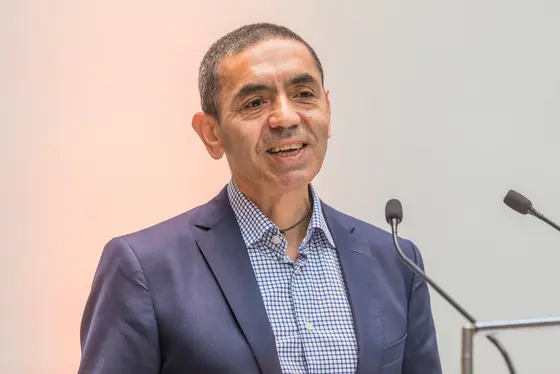The compelling idea behind the concept of mRNA-based cancer immunotherapies: Messenger RNA molecules (mRNA) are used to get the body to produce its own tumor proteins that stimulate the immune system to fight the cancer. The great advantage of this approach is that it makes it comparatively easy and fast to produce highly individualized tumor vaccines. To do this, scientists first search the tumor genome of individual patients for mutations that distinguish cancer cells from healthy cells and that are possible targets for a therapeutic vaccine. The appropriate mRNA molecules containing these mutations are then produced in the laboratory and can be used as an individual therapeutic cancer vaccine.
Uǧur Șahin is one of the world's most important pioneers in this research field. The professor of translational oncology and immunology at the University Medical Center Mainz and co-founder of BioNTech AG has already conducted early clinical trials on the efficacy of personalized mRNA vaccines against cancer. But there is still an immense need for research: Which target structures are suitable, which types of cancer can be treated with this therapy, how can cancer cells be prevented from evading immune attack? And is mRNA vaccination sufficient as a therapy or must it be combined with other treatments? These are just some of the questions that the researchers in Șahin's department, which was established on February 1 at the DKFZ as the sponsor of HI-TRON Mainz, intend to address.
In the Helmholtz Institute for Translational Oncology Mainz (HI-TRON Mainz), the German Cancer Research Center (DKFZ) cooperates with the Research Institute for Translational Oncology at the University Medical Center of the Johannes Gutenberg University Mainz (TRON gGmbH), the University Medical Center Mainz and the Johannes Gutenberg University Mainz to bring together the partners' internationally outstanding expertise in the field of personalized immunotherapy with cutting-edge translational research at DKFZ. The mission of HI-TRON Mainz is to build on the expertise and know-how of the partners to exploit the potential of individualized immunotherapy for the benefit of cancer patients. The strategic goal is also to position Germany in the leading international league in this innovative and relevant field.
With the Helmholtz Institutes, the Helmholtz Association creates the basis for a lasting close collaboration between a Helmholtz Center, in this case the DKFZ, and a university in a field of research that is of particular importance to both partners.



